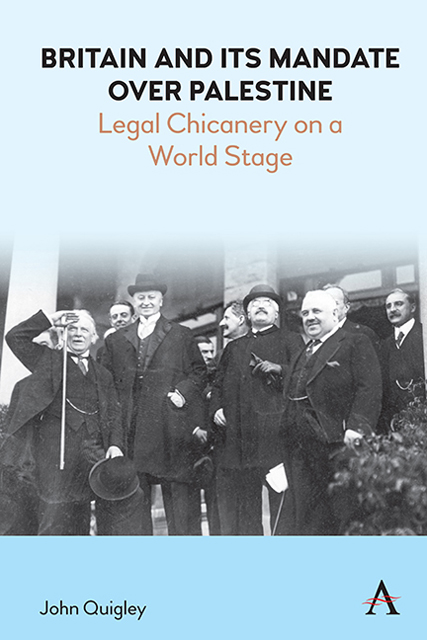Book contents
- Frontmatter
- Contents
- Preface
- Setting the Stage: Was Britain’s Rule in Palestine Legal?
- 1 The Balfour Declaration Is the Focal Point for the Legal Situation of Palestine
- 2 The Balfour Declaration Was a Binding Commitment to the Jewish People
- 3 The Jewish National Home Meant a Jewish State
- 4 The Balfour Declaration Was Issued to Affirm Jewish Rights in Palestine
- 5 The Paris Peace Conference Raised Jewish Statehood to the International Level
- 6 Britain’s Allies Made the Balfour Declaration an International Commitment
- 7 Britain’s Allies Endorsed Jewish Rights
- 8 Britain Took on Palestine Because of the League’s Mandate System
- 9 The League of Nations Protected Palestine’s Arab Population
- 10 Britain Was Given Palestine by the League of Nations
- 11 The League of Nations Put the Palestine Mandate into Legal Force
- 12 The Peace Treaty with Turkey Legalized Britain’s Status in Palestine
- 13 The Palestine Mandate Document Was a Treaty between Britain and the League
- 14 The League of Nations Required Britain to Implement the Balfour Declaration
- 15 The Palestine Mandate Document Implemented the League Covenant
- 16 The Palestine Mandate Document Recognized Jews as a National Group
- 17 The Palestine Mandate Document Bound Britain to the Balfour Declaration
- 18 The International Community Committed Itself to the Balfour Declaration
- 19 Britain Held Legal Status in Palestine
- 20 The United Nations Charter Carried Forward a Jewish Entitlement to Statehood
- Postscript: Why History Matters
- Documents Annex
- Notes
- Bibliography
- Index
16 - The Palestine Mandate Document Recognized Jews as a National Group
Published online by Cambridge University Press: 10 January 2023
- Frontmatter
- Contents
- Preface
- Setting the Stage: Was Britain’s Rule in Palestine Legal?
- 1 The Balfour Declaration Is the Focal Point for the Legal Situation of Palestine
- 2 The Balfour Declaration Was a Binding Commitment to the Jewish People
- 3 The Jewish National Home Meant a Jewish State
- 4 The Balfour Declaration Was Issued to Affirm Jewish Rights in Palestine
- 5 The Paris Peace Conference Raised Jewish Statehood to the International Level
- 6 Britain’s Allies Made the Balfour Declaration an International Commitment
- 7 Britain’s Allies Endorsed Jewish Rights
- 8 Britain Took on Palestine Because of the League’s Mandate System
- 9 The League of Nations Protected Palestine’s Arab Population
- 10 Britain Was Given Palestine by the League of Nations
- 11 The League of Nations Put the Palestine Mandate into Legal Force
- 12 The Peace Treaty with Turkey Legalized Britain’s Status in Palestine
- 13 The Palestine Mandate Document Was a Treaty between Britain and the League
- 14 The League of Nations Required Britain to Implement the Balfour Declaration
- 15 The Palestine Mandate Document Implemented the League Covenant
- 16 The Palestine Mandate Document Recognized Jews as a National Group
- 17 The Palestine Mandate Document Bound Britain to the Balfour Declaration
- 18 The International Community Committed Itself to the Balfour Declaration
- 19 Britain Held Legal Status in Palestine
- 20 The United Nations Charter Carried Forward a Jewish Entitlement to Statehood
- Postscript: Why History Matters
- Documents Annex
- Notes
- Bibliography
- Index
Summary
An element of the Narrative, as we have just seen, is that Jewry was regarded as holding a collective right to territorial entitlement in Palestine. The 1948 declaration of statehood claimed that this right was “re-affirmed” in the Palestine mandate document. The declaration recited that the 1897 Zionist congress called for the “the right of the Jewish people to national rebirth in its own country. This right,” the 1948 declaration continued, “was recognized in the Balfour Declaration of 2 November 1917, and reaffirmed in the Mandate of the League of Nations, which, in particular, gave international sanction to the historic connection between the Jewish people and Eretz-Israel and to the right of the Jewish people to rebuild its National Home.”
The 1948 declaration's reference to the mandate document as a document “of the League of Nations” was questionable since, as we have seen, the document was written by the British Government, not by the League of Nations. The reference to “the Jewish people” held significance, because only a “people” has a right to self-determination. Further, even a group that is a “people” may not necessarily be entitled to exercise self-determination in a particular territory. As was the case in Palestine, another people may have their own claim. The claim of a right for the Jewish people was particularly problematic since they, in the main, did not inhabit the territory of Palestine. A people making a claim to a territory typically inhabits that territory. This circumstance was lacking for Jewry. One early analyst of the Palestine mandate referred to Jews as “an absent people.”
As a minimum, in any event, the collectivity making a territorial claim must be a “people.” Ruth Gavison, professor in international law at the Hebrew University, explained in a book published by the Jerusalem Center for Public Affairs, “The claim that Jews are not a nation in the context of our concerns comes from the fact that international law recognizes the right of peoples to self-determination, while only recognizing cultural and religious rights for other cultural groups, with a special sensitivity to the claims of national minorities. If Jews are only a religion, basic elements of their claim to a right to selfdetermination in Zion may be undermined.”
- Type
- Chapter
- Information
- Britain and its Mandate over PalestineLegal Chicanery on a World Stage, pp. 123 - 126Publisher: Anthem PressPrint publication year: 2022

